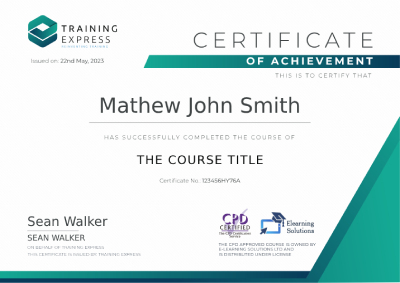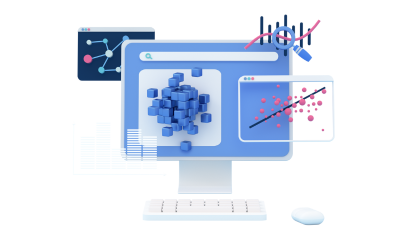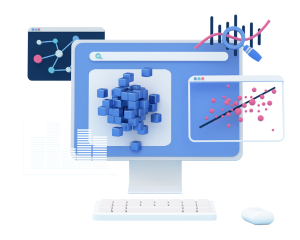GET THIS COURSE AND 1500+ OTHERS FOR ONLY £49 PER YEAR. FIND OUT MORE
Python for Data Science & Machine Learning: Zero to Hero teaches you everything on the topic thoroughly from scratch so you can achieve a professional certificate for free to showcase your achievement in professional life. This Python for Data Science & Machine Learning: Zero to Hero is a comprehensive, instructor-guided course, designed to provide a detailed understanding of the nature of the related sector and your key roles within it.
To become successful in your profession, you must have a specific set of skills to succeed in today’s competitive world. In this in-depth training course, you will develop the most in-demand skills to kickstart your career, as well as upgrade your existing knowledge & skills.
The training materials of this course are available online for you to learn at your own pace and fast-track your career with ease.
- Accredited by CPD
- Instant e-certificate and hard copy dispatch by next working day
- Fully online, interactive course with audio voiceover
- Self-paced learning and laptop, tablet, smartphone-friendly
- 24/7 Learning Assistance
- Discounts on bulk purchases
Who should take the course
Anyone with a knack for learning new skills can take this Python for Data Science & Machine Learning: Zero to Hero. While this comprehensive training is popular for preparing people for job opportunities in the relevant fields, it also helps to advance your career for promotions.
Certification
Once you’ve successfully completed your course, you will immediately be sent a digital certificate. Also, you can have your printed certificate delivered by post (shipping cost £3.99). All of our courses are fully accredited, providing you with up-to-date skills and knowledge and helping you to become more competent and effective in your chosen field. Our certifications have no expiry dates, although we do recommend that you renew them every 12 months.

Accreditation
All of our courses, including this Python for Data Science & Machine Learning: Zero to Hero, are fully accredited, providing you with up-to-date skills and knowledge and helping you to become more competent and effective in your chosen field.
Course Curriculum
The detailed curriculum outline of our Python for Data Science & Machine Learning: Zero to Hero is as follows:
- Welcome to the Python for Data Science & ML bootcamp!
- Introduction to Python
- Setting Up Python
- What is Jupyter?
- Anaconda Installation Windows Mac and Ubuntu
- How to implement Python in Jupyter
- Managing Directories in Jupyter Notebook
- Input & Output
- Working with different datatypes
- Variables
- Arithmetic Operators
- Comparison Operators
- Logical Operators
- Conditional statements
- Loops
- Sequences Part 1: Lists
- Sequences Part 2: Dictionaries
- Sequences Part 3: Tuples
- Functions Part 1: Built-in Functions
- Functions Part 2: User-defined Functions
- Course Materials
- Installing Libraries
- Importing Libraries
- Pandas Library for Data Science
- NumPy Library for Data Science
- Pandas vs NumPy
- Matplotlib Library for Data Science
- Seaborn Library for Data Science
- Introduction to NumPy arrays
- Creating NumPy arrays
- Indexing NumPy arrays
- Array shape
- Iterating Over NumPy Arrays
- Basic NumPy arrays: zeros()
- Basic NumPy arrays: ones()
- Basic NumPy arrays: full()
- Adding a scalar
- Subtracting a scalar
- Multiplying by a scalar
- Dividing by a scalar
- Raise to a power
- Transpose
- Element-wise addition
- Element-wise subtraction
- Element-wise multiplication
- Element-wise division
- Matrix multiplication
- Statistics
- What is a Python Pandas DataFrame?
- What is a Python Pandas Series?
- DataFrame vs Series
- Creating a DataFrame using lists
- Creating a DataFrame using a dictionary
- Loading CSV data into python
- Changing the Index Column
- Inplace
- Examining the DataFrame: Head & Tail
- Statistical summary of the data frame
- Slicing rows using bracket operators
- Indexing columns using bracket operators
- Boolean list
- Filtering Rows
- Filtering rows using AND OR operators
- Filtering data using loc()
- Filtering data using iloc()
- Adding and deleting rows and columns
- Sorting Values
- Exporting and saving pandas DataFrames
- Concatenating DataFrames
- groupby()
- Introduction to Data Cleaning
- Quality of Data
- Examples of Anomalies
- Median-based Anomaly Detection
- Mean-based anomaly detection
- Z-score-based Anomaly Detection
- Interquartile Range for Anomaly Detection
- Dealing with missing values
- Regular Expressions
- Feature Scaling
- Introduction
- What is Exploratory Data Analysis?
- Univariate Analysis
- Univariate Analysis: Continuous Data
- Univariate Analysis: Categorical Data
- Bivariate analysis: Continuous & Continuous
- Bivariate analysis: Categorical & Categorical
- Bivariate analysis: Continuous & Categorical
- Detecting Outliers
- Categorical Variable Transformation
- Introduction to Time Series
- Getting stock data using yfinance
- Converting a Dataset into Time Series
- Working with Time Series
- Visualising a Time Series
- Data Visualisation using python
- Setting Up Matplotlib
- Plotting Line Plots using Matplotlib
- Title, Labels & Legend
- Plotting Histograms
- Plotting Bar Charts
- Plotting Pie Charts
- Plotting Scatter Plots
- Plotting Log Plots
- Plotting Polar Plots
- Handling Dates
- Creating multiple subplots in one figure
- What is Machine Learning?
- Applications of machine learning
- Machine Learning Methods
- What is Supervised learning?
- What is Unsupervised learning?
- Supervised learning vs Unsupervised learning
- Introduction to regression
- How Does Linear Regression Work?
- Line representation
- Implementation in python: Importing libraries & datasets
- Implementation in python: Distribution of the data
- Implementation in python: Creating a linear regression object
- Understanding Multiple linear regression
- Exploring the dataset
- Encoding Categorical Data
- Splitting data into Train and Test Sets
- Training the model on the Training set
- Predicting the Test Set results
- Evaluating the performance of the regression model
- Root Mean Squared Error in Python
- Introduction to classification
- K-Nearest Neighbours algorithm
- Example of KNN
- K-Nearest Neighbours (KNN) using python
- Importing required libraries
- Importing the dataset
- Splitting data into Train and Test Sets
- Feature Scaling
- Importing the KNN classifier
- Results prediction & Confusion matrix
- Introduction to decision trees
- What is Entropy?
- Exploring the dataset
- Decision tree structure
- Importing libraries & datasets
- Encoding Categorical Data
- Splitting data into Train and Test Sets
- Results Prediction & Accuracy
- Introduction
- Implementation steps
- Importing libraries & datasets
- Splitting data into Train and Test Sets
- Pre-processing
- Training the model
- Results prediction & Confusion matrix
- Logistic Regression vs Linear Regression
- Introduction to clustering
- Use cases
- K-Means Clustering Algorithm
- Elbow method
- Steps of the Elbow method
- Implementation in python
- Hierarchical clustering
- Density-based clustering
- Implementation of k-means clustering in python
- Importing the dataset
- Visualising the dataset
- Defining the classifier
- 3D Visualisation of the clusters
- 3D Visualisation of the predicted values
- Number of predicted clusters
- Introduction
- Collaborative Filtering in Recommender Systems
- Content-based Recommender System
- Importing libraries & datasets
- Merging datasets into one dataframe
- Sorting by title and rating
- Histogram showing number of ratings
- Frequency distribution
- Jointplot of the ratings and number of ratings
- Data pre-processing
- Sorting the most-rated movies
- Grabbing the ratings for two movies
- Correlation between the most-rated movies
- Sorting the data by correlation
- Filtering out movies
- Sorting values
- Repeating the process for another movie
- Conclusion

Or
£125.00Original price was: £125.00.£25.00Current price is: £25.00.- 1 year
- Intermediate
- Course Certificate
- 6 hours, 15 minutes Gift this course
Subscribe to this course and 2,000+ top‑rated Training Express courses for your organization.
Try Training Express Business- For teams of 5 or more users
- 2,000+ fresh & in-demand courses
- Learning Engagement tools
- SSO and LMS Integrations
 Food Hygiene
Food Hygiene Health & Safety
Health & Safety Safeguarding
Safeguarding First Aid
First Aid Business Skills
Business Skills Personal Development
Personal Development




 All courses for £49
All courses for £49 



